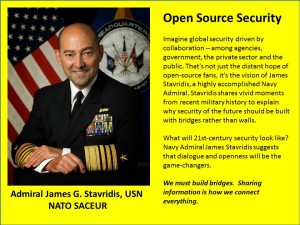
Talking ‘Smart Power' With Admiral Stavridis
By Oliver Barrett
US News & World Report, July 25, 2013
With one-liners like, “We are excellent at launching Tomahawk missiles; we need to get better at launching ideas,” it is not hard to appreciate why The New York Times labeled recently retired Admiral James Stavridis a “Renaissance admiral.” Labels like “innovator” and “thought leader” may be overused, but Stavridis lives up to the hype, nudging the U.S. military not only to be more adaptive and less insular, but also to re-examine its role in international conflict resolution in places like Latin America and Afghanistan.
The former Aircraft Carrier Group Commander, TED Talk guest, author and overlord of all NATO missions, including the 2011 NATO-led operation in Libya, champions a revolutionary approach to the most vexing conflicts of our day. Stavridis has challenged the stagnant military culture and pushed for the transformation of organizations like U.S. Southern Command from an old school military planning citadel to an agile organization better able to “plug ‘n play” with non-traditional partners. The admiral believes the U.S. can help partners to end conflict quickly, reconstruct and then develop through the application of “smart power”: the effective combination of soft power (diplomacy and development) and hard power (military might).
RELATED:
2013 Robert Steele Foreword to NATO Book on Public Intelligence for Public Health
2013 Robert Steele Reflections on NATO 4.0 — Key Challenges AND Solutions 1.2
2012 TED: James Stavridis: How NATO’s Supreme Commander thinks about global security
Berto Jongman: Admrial James Stavrides Expands on “Open Source Security”
DOC (6 Pages): 2013 Open Source Agency
References: NATO Transformation Process Documents — and Gaps + Peace from Above RECAP
Phi Beta Iota: Admiral Stavrides, on his way out the door at NATO, launched one really big idea, “Open Source Security,” and then dropped the ball. He is now fully occupied as a Dean at Tufts, and it is very unlikely that any combination of minds in the US Government will in the next two years get anywhere near either Open Source Everything (OSE) or “Smart Power.” By definition, Smart Power requires intelligence with integrity — this is not to be found in Washington, D.C.
See Also:
Handbooks for Training
Historic Contributions 1957-2006
IO Tools (List & Links)
Manifesto Extracts
NATO OSE/M4IS2 2.0
Open Source Agency (OSA)
Public Intelligence 3.8
Story Board on Decision Support
USA Reform Ideas
Way of the Truth



